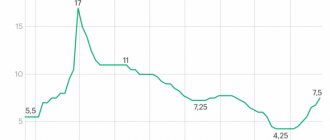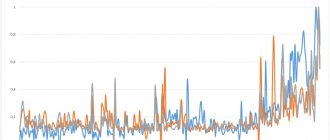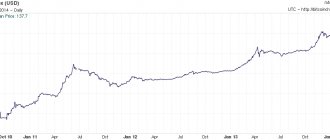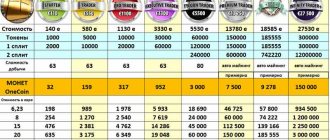Bitcoin mining in China has fallen to almost zero following a recent government crackdown. This has already had a huge impact on the entire market, including (especially) Russia. The changes affect not only enthusiasts; in the last month, everyone has felt them, even grandmothers from Irkutsk.
If you lived in a bunker:
- Until May of this year, half of the world's Bitcoin mining was concentrated in China. Since spring, cryptocurrency has gradually been banned in the country; banks and payment services have stopped using it.
- On September 24, the People's Bank of China declared all cryptocurrency-related activities illegal. Including its extraction, purchase/sale and even storage and sale.
- On September 28, China even blocked sites for tracking cryptocurrency rates (CoinGecko, CoinMarketCap and TradingView). Crypto exchanges had been banned several years before.
- Alibaba announced a complete ban on the sale of any mining devices on all of its sites.
- Since October, Chinese authorities have added mining to the list of industries prohibited for investment. This applies to both Chinese and foreign investments.
Everyone fled China. It has gotten to the point that Russia has now become the third country in the world for Bitcoin mining. And the second place suddenly turned out to be Kazakhstan, where for the last six months, seeing the seriousness of the party’s intentions, the Chinese have been exporting their mining farms.
Why does China need this?
It would seem that what difference does it make if crypto enthusiasts (or respectable businessmen) mine different coins and bring dollars into the country. But the behavior of the Chinese leadership is not just Russian “we prohibit it because we can.” They have three motives:
- China is trying to become an environmentally friendly country. And he signed several international treaties on this matter. Xi Jinping said last year that the country aims to peak carbon dioxide emissions by 2030, then decline, and achieve carbon neutrality by 2060. But Bitcoin alone threatened to derail these plans. Without political intervention, China's annual blockchain energy consumption was expected to be 300 TWh by 2024 (more than all of Britain's consumption and a third of Russia's). This would result in the release of an extra 130 million tons of carbon.
- Chinese authorities believe that transactions with cryptocurrencies may lead to the withdrawal of money from the country. In September, they said Bitcoin, ether and other digital currencies were disrupting the financial system and being used for money laundering by criminal groups.
- Perhaps most importantly, China views cryptocurrencies as a threat to its sovereign “digital yuan,” which has just recently entered a new experimental stage.
Digital yuan is electronic money that is issued by the People's Bank of China and costs the same as regular paper banknotes in China. Work on introducing a digital currency began at the end of 2019. It was tested in the cities of Shenzhen, Suzhou, Chengdu and the Xiong'an New Economic Zone near Beijing. In October 2020, the cities of Shanghai, Changsha, Xi'an, Qingdao, Dalian and Hainan Province were added here. And starting this November, the pilot project is going out across the whole country.
After the Bitcoin ban, the success of e-CNY is now guaranteed. 21 million private and 3.5 million corporate wallets with digital yuan have already been opened. The total volume of transactions amounted to 34.5 billion yuan (about $5.3 billion). The government is very actively promoting its project. In test cities they are used to pay utility bills and fines. Lotteries are being organized for people: 200 thousand citizens have already received 200 digital yuan for free.
There is no place left for “too free” Bitcoin in China’s internal affairs. He was kicked out of the country in record time.
Bitcoin - the leading cryptocurrency
Bitcoin is the world's most popular cryptocurrency. It has no bills and cannot be touched, as it is entirely based on cryptographic methods. Its most important principle is complete decentralization, it has no central administrator, and it is not subject to financial regulators and banks. This makes Bitcoin radically different from any payment unit in the world.
What is Bitcoin and how does it work?
How it happened
It only took a few months for miners to completely disappear from China. Despite the fact that in September 2019, the country accounted for 75.53% of global cryptocurrency production.
But then Bitcoin began to be covered in the news, asking whether it was so profitable and telling how drug traffickers used it as a cover abroad. ICOs and crypto exchanges were banned. Smart businessmen quickly realized which way the wind was blowing. China's share in mining dropped to 46% by April 2021 - even before new government measures were announced. By the way, independent data on countries is collected by the Cambridge Center for Alternative Finance (CCAF), their graphs can be viewed here.
A speech by a senior official on May 21 signaled that more serious crackdown was coming. Chinese miners rushed out. Global bitcoin mining capacity had fallen by 30% by early June. They say that hundreds of entrepreneurs loaded tons of software (!) onto trucks and moved to neighboring countries - Kazakhstan and Russia - almost overnight.
By July, Bitcoin's hashrate had dropped by more than 50%. But then, as CCAF data shows, recovery began. Miners have successfully restarted their operations in other countries. And now production is already close to May values.
The main winner of this wave of migration was the United States, whose share of global production increased from 17% in April to 35% in September. In second place is Kazakhstan, with 18% instead of 8%. In third place is Russia, whose share of hashrate increased from 6.8% to 11.2%.
A wallet is also needed for Bitcoin
Cryptocurrencies are stored in electronic wallets (Wallet). More precisely, electronic keys are stored there, which are proof of the legal ownership of bitcoins by their owner. Wallets can be located on computers, smartphones, USB sticks, cloud storage, and so on. The main thing is the reliability of storage, since with the loss of keys comes the loss of bitcoins.
What is Bitcoin and how does it work?
Peer-to-peer (P2P) markets
Even though companies involved in crypto transactions were banned in the country, individuals continued to act as intermediaries—some of whom recorded more than 10,000 successful peer-to-peer transactions, according to the exchange's own rating system. Both Huobi and Binance offer a similar marketplace where users can trade multiple cryptocurrencies, including USD Tether (USDT). Once their fiat is converted into a stablecoin, it becomes possible to transact on a regular or derivative exchange.
Mining: speed competition
Before final confirmation of a transaction (such as payment for a hat), miners must verify it, which requires enormous server and graphics card processing power. Essentially, miners are participating in a kind of speed competition: whoever first verifies a block of information will receive bitcoins for it.
What is Bitcoin and how does it work?
What do miners do?
This new block with information about payment for the hat soon appears on all computers of participants in the cryptocurrency system. They are also called miners. Their computers check transactions formed in blocks and confirm them. Theoretically, anyone can become a miner, but in practice today this role is performed by professional miners with powerful server equipment.
What is Bitcoin and how does it work?
First the chairs, then the money (bitcoins)
Here is an example of a Bitcoin transaction. The buyer (in the picture on the left) is about to purchase a product from the seller - for example, a hat. Both require a public and private key to complete a transaction. The public key can be compared to a bank account number, the private key to the secret code for confirming a bank transaction.
What is Bitcoin and how does it work?
What does blockchain have to do with it?
The seller presents the public key to the buyer. He, in turn, confirms the payment with his private key and thus begins the process of sending money. Computer information about this transaction, along with hundreds of other transactions, forms a special structure - a “block”, which is attached to a chain of other blocks containing data from other previously occurring transactions.
What is Bitcoin and how does it work?
Capital from China will return
To support his words, Mou cites statistics reflecting an “unprecedented outflow” of capital from Asia and a decline in the BTC rate during Asian trading hours.
From the latest data from analytics service Glassnode, you can see that this bearish pressure especially intensified in November and December.
According to the Glassnode report, during the Asian sessions, the crypto market is indeed often trading lower compared to the European and American sessions. This confirms that Asian investors are now the main driving force behind sales, Mou said.
However, Mou hopes that next year this downward pressure on the crypto market from China will begin to weaken, which will lead to a recovery in prices.
He expects that the money from Chinese investors now leaving the crypto market will eventually come back. The only question, he explains, is that the current situation with trading platforms and access to trading is very uncertain. People are waiting it out by withdrawing their funds from crypto assets into yuan.
Blockchain: An anonymous chain of blocks
As a result, the block with “packed” and verified information about the payment for the hat becomes part of a long chain of blocks - the blockchain. This chain contains all the Bitcoin transactions that have taken place. In this open ledger, you can find all the transactions and wallets of all participants - but at the same time, all participants in the calculations remain anonymous.
What is Bitcoin and how does it work?
Pressure on BTC comes from China
Samson Mow, director of strategy at the Canadian blockchain company Blockstream, said in an interview with BeinCrypto that there is currently significant bearish pressure on the crypto market from Asian investors. Against this background, the BTC rate retreated from its historical maximum, updated on November 10.
According to Mou, the market is now under attack as crypto companies flee mainland China, which has launched a crackdown on miners and the cryptocurrency business in general, including overseas trading platforms.
Sponsored
Sponsored
Mou cited two of the largest platforms for trading digital assets as examples: Binance and Huobi Global. They are expected to shut down all their P2P services in China by the end of the year. Both platforms were extremely popular in the Middle Kingdom, but they stopped registering new accounts after Beijing introduced a cryptocurrency ban in September.
“Accordingly, people are liquidating their positions in a hurry to catch up before the collapse of P2P applications,” explained Mou.
He added that the situation is also aggravated by the imminent arrival of the Chinese New Year [in early February], for which people traditionally need cash.
What do you think? Share your thoughts with us in the comments and join the discussion in our Telegram channel.
Where do miners live?
The world's largest mining capacity - and the highest energy consumption for these purposes - is today in China. So say researchers from the University of Cambridge, authors of the Bitcoin Electricity Consumption Index. Next on the list are the USA, Russia, Kazakhstan, Iran and Malaysia. Mining is most profitable where electricity prices are low.











